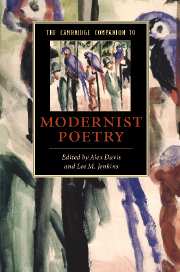Book contents
- Frontmatter
- Introduction
- Part I: Contexts
- Part II: Authors and Alliances
- 5 Pound or Eliot: whose era?
- 6 H.D. and revisionary myth-making
- 7 Yeats, Ireland and modernism
- 8 Modernist poetry in the British Isles
- 9 US modernism I: Moore, Stevens and the modernist lyric
- 10 US modernism II: the other tradition - Williams, Zukofsky and Olson
- 11 The poetry of the Harlem Renaissance
- 12 Caliban’s modernity: postcolonial poetry of Africa, South Asia and the Caribbean
- Part III: Receptions
- Guide to further reading
- Index
- Series List
5 - Pound or Eliot: whose era?
from Part II: - Authors and Alliances
Published online by Cambridge University Press: 28 November 2007
- Frontmatter
- Introduction
- Part I: Contexts
- Part II: Authors and Alliances
- 5 Pound or Eliot: whose era?
- 6 H.D. and revisionary myth-making
- 7 Yeats, Ireland and modernism
- 8 Modernist poetry in the British Isles
- 9 US modernism I: Moore, Stevens and the modernist lyric
- 10 US modernism II: the other tradition - Williams, Zukofsky and Olson
- 11 The poetry of the Harlem Renaissance
- 12 Caliban’s modernity: postcolonial poetry of Africa, South Asia and the Caribbean
- Part III: Receptions
- Guide to further reading
- Index
- Series List
Summary
'Our age beyond any doubt has been, and will continue to be, the Age of Eliot', wrote the novelist and critic Conrad Aiken in a commemorative essay which appeared shortly after T. S. Eliot's death in 1965. Opinion on the other side of the Atlantic concurred: the headline over Eliot's obituary in the London Times declared him 'The Most Influential English Poet of His Time'. Consensus so uniform inevitably invites dissent, and it was only six years later that the distinguished critic Hugh Kenner published a provocative and influential book, one still essential for anyone striving to assess Anglo- American modernism. Its title, The Pound Era, implicitly repudiated the widespread belief that Eliot had dominated his age. It was Ezra Pound, instead, who had reshaped the poetic and literary sensibility of a generation. Four decades later, a reader may legitimately wonder which of these arresting figures was truly the major poet of his time. Yet to pose that question in that way may also obscure more than it illuminates. For what does it mean to declare that one poet or another was 'the poet of his age'? Would it be a strictly historical statement, a question of how many readers preferred or even purchased the works of either? Would it be a matter, say, of counting up the number of book reviews and news items that featured one or the other? Or a matter, say, of somehow measuring influence, totalling the number of imitators that later gathered around either? There are countless ways that we might reformulate that question, but one good starting point might be to reconsider the decade that was most plainly the era of neither, or perhaps of both - the decade when Pound and Eliot collaborated to achieve a profound transformation in the conventions of modern poetry, the years 1914 to 1923.
- Type
- Chapter
- Information
- The Cambridge Companion to Modernist Poetry , pp. 87 - 113Publisher: Cambridge University PressPrint publication year: 2007
- 3
- Cited by

